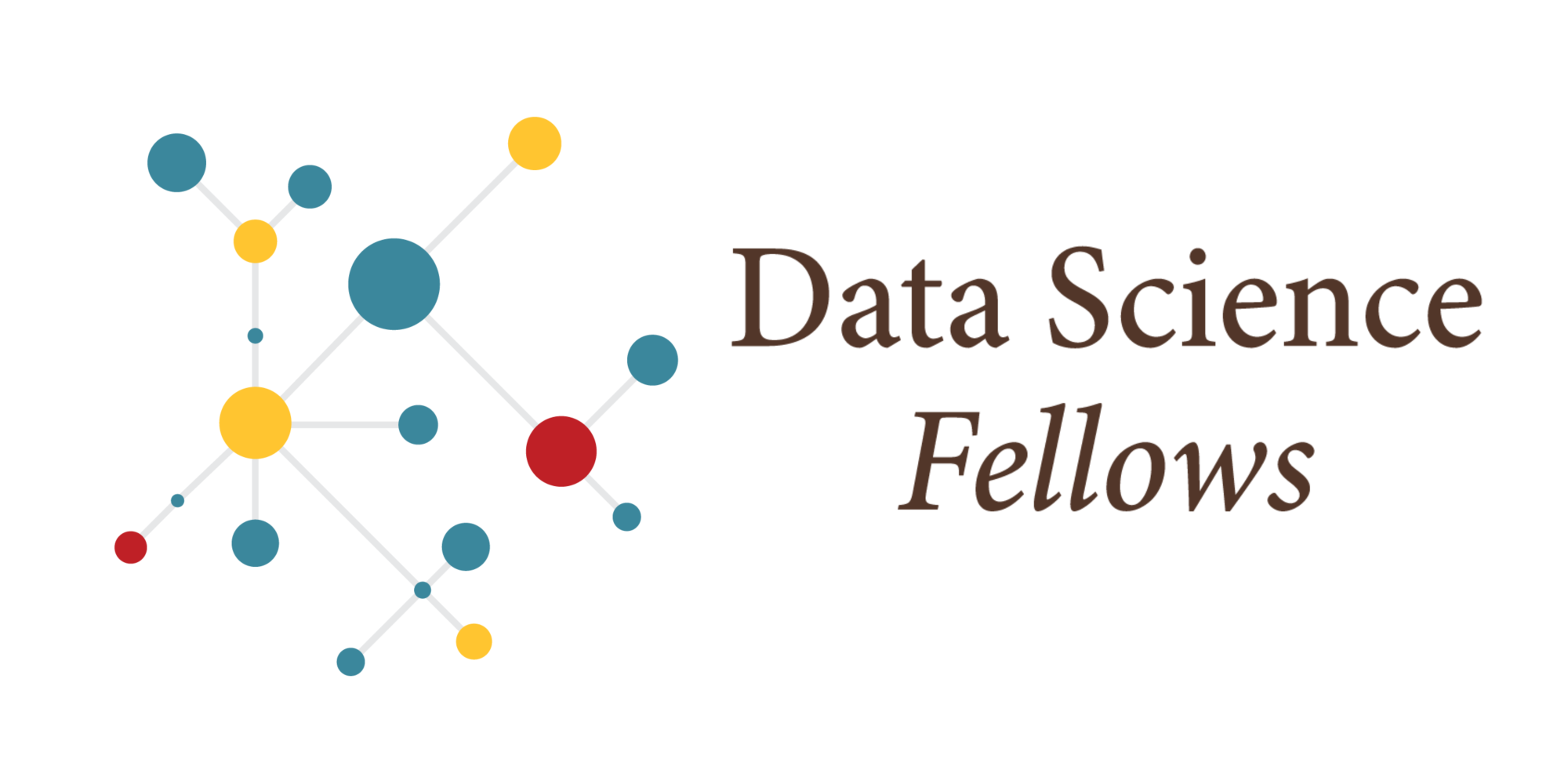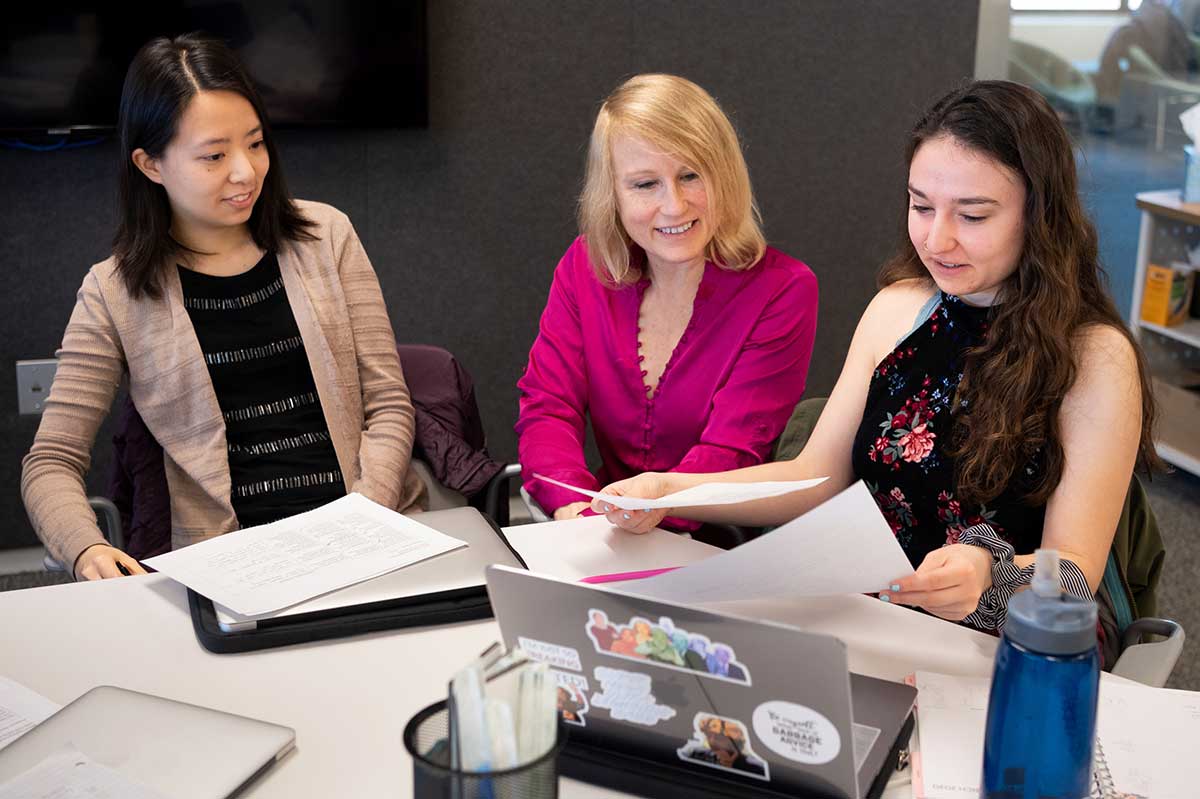DATA 1150: Data Science Fellows
Offered Fall semester.
Data science is growing fast, with tools, approaches, and results evolving rapidly. This course is for junior and senior level students with familiarity with data science tools and skills, seeking to apply these skills and teach others how to implement and interpret data science. Working in conjunction with a faculty sponsor, this course teaches students communication skills, how to determine the needs (requirements) for a project, and how to teach data science to peers. These valuable agile skills will be an incredible advantage moving forward in your professional development. While Data Science Fellows can come from any concentration, they should have some experience or expressed aptitude (formal or informal) in one of the following areas: programming, statistics/applied math, or data visualization.
Application & Timeline
Students interested in enrolling in DATA 1150 will need to complete an application form prior to pre-registration, describing their interest in becoming a Data Science Fellow and their experience with data science. This application form is also linked in the course description on Courses@Brown.
For priority consideration, students interested in taking DATA 1150 in Fall 2026 should apply by May 1, 2025. Students meeting the initial criteria will be invited to a zoom interview with the instructor for final approval to register for the course. After the May 1st priority deadline, students that apply by August 1st may still be considered depending on project availability but are not guaranteed an interview or enrollment in the course.
Prerequisites
- Advanced experience in and familiarity with data science strategies and/or tools (for example, coding, statistics, or visualizations) are required for this course.
- Data Fluency Certificate students must complete DATA 0200 prior to DATA 1150
- Junior or Senior standing
- Permission of the instructor
- Completion of the data science fellows interest form
Learning Objectives
- Communicate both verbally and in writing with a sponsoring faculty member to align expectations about a data science project, balancing the needs (requirements) to implement data science in an instructional class as well the abilities of the student
- Apply soft skills, communication and project management to serve as a project leader, beyond the scope of a traditional student project assistant
- Demonstrate the appropriate baseline and other data science skills and tools to meet the learning objectives of the faculty member for advancing data science pedagogy
- Integrate data science thinking and methods into courses in different disciplines that are appropriate for the skill levels of the courses
- Identify and implement effective teaching strategies to both your peers to maximize student learning
- Reflect on communication, teaching, and learning to identify effective strategies that are coherent with their own communication, teaching, and learning styles
- Write clear and measurable learning objective(s) related to the needs articulated by the faculty member
- Identify effective assessment techniques to measure stated learning objectives
- Read and analyze scholarly written work
Compensation
Data Science Fellows will earn up to 10 hours per week (paid at the UTA department rate for the course) during the semester for their work with faculty.
Questions?
Any questions about the Data Fellows course should be sent to Linda Clark at Linda_Clark@Brown.edu.
See this information for students from the Sheridan Center for Teaching and Learning
Have you ever thought about introducing your students to a new way of thinking about your discipline through data? Is there a data related tool out there that might enhance your teaching? Are you a little overwhelmed by thinking about ‘what is data science anyway’? If you find yourself thinking about these issues, please consider applying to work with a Data Science Fellow during the Fall 2024 to assist you with your data science related course development.
To apply, complete this interest form. For more information about prior projects, see the examples below.
Request a Data Science Fellow
Data Science Course Design Institute
Data Science in My Course?
Have you ever thought about introducing your students to a new way of thinking about your discipline through data? Is there a data related tool out there that might enhance your teaching? Are you a little overwhelmed by thinking about ‘what is data science anyway’? If you find yourself thinking about these issues, the Data Science Course Design Institute (DSCDI) is a great opportunity for you to begin to develop new, or enhance existing data science related content in your course.
As a participant in the DSCDI you will:
- Acquire a better understanding of the scope of the field of data science
- Observe and discuss strategies to teach data science content, with an emphasis on differentiating among different levels of technical skills
- Write a data science learning outcome for your course
- Create a outline for a data science related teaching and learning experience
In addition to the content knowledge, participants in the institute receive a $750.00 stipend to faculty research accounts. Participants are also given priority to collaborate with a Data Science Fellow in Fall 2024. The Data Science Fellow is an undergraduate student with data science skills to assist the faculty member with implementing the plan generated in the course design institute. Data science fellow stipends are compensated by the Sheridan Center and thus no cost to you or your department.
Past participants in the DSCDI find the implementation of their curricular innovations greatly advanced by the collaborative discussions and information in the DSCDI. Some examples of past projects include:
- Developing in-class tutorials on R and Python
- Enhancing data visualizations of challenging statistical principles
- Text mining literature corpus to identify key readings to align with learning outcomes
- Leveraging Python to study Arabic proper name roots and cultural connections
- Leveraging pre-scripted Python notebooks to facilitate data analysis and results for lab based courses.
- Developing machine learning examples using domain specific data
- Exploring image segmentation to identify a process to categorize ancient images for classroom instruction
- Providing replicable data analysis from scholarly articles
- Developing a web-based tool to determine foreign language proficiency standards
- Web scraping and text mining student survey responses to provide formative feedback for curricular content
- Developing a new DATA First Year Seminar course at Brown
- Developing a series of instructional videos about using the pandas package in Python
- Integrating data visualizations and better survey writing into Chinese language courses
- Designing an easily editable Community Profile Flyer template to quickly create personalized flyers for organizations in Rhode Island that work with Black communities
- Building an OCR model with the goal of accelerating the pace at which researchers and learners can parse massive amounts of hieroglyph data
The Spring 2024 DSCDI will be completely remote, starting in early February 2024 through April 2024. There will be one synchronous meeting (one and a half hours long) each month (February, March and April). There will be a total of three modules for the DSCDI, for each module participants will be expected to:
- Read one to two articles (guiding questions provided)
- Post a reaction to the institute discussion forum
- Respond to a colleague’s reaction
- Record developing data science related plans for their own teaching
- Complete an ‘entry ticket’ for each synchronous meeting
Return here for the 2025 DSCDI Interest Form.
See this information for faculty from the Sheridan Center for Teaching and Learning
Students interested in enrolling in DATA 1150 will need to complete an application form prior to pre-registration, describing their interest in becoming a Data Science Fellow and their experience with data science. This application form is also linked in the course description on Courses@Brown.
For priority consideration, students interested in taking DATA 1150 in Fall 2026 should apply by May 1, 2025. Students meeting the initial criteria will be invited to a zoom interview with the instructor for final approval to register for the course. After the May 1st priority deadline, students that apply by August 1st may still be considered depending on project availability but are not guaranteed an interview or enrollment in the course.
Please email Linda Clark (linda_clark@brown.edu) to apply or get more information.

 Undergraduates interested in data science and collaborative work with a faculty member have the opportunity to enroll in the Data Science Fellows course (DATA 1150, offered each fall semester). This course will prepare the Data Science Fellows to serve as consultants for faculty wishing to enhance data science curricula at Brown.
Undergraduates interested in data science and collaborative work with a faculty member have the opportunity to enroll in the Data Science Fellows course (DATA 1150, offered each fall semester). This course will prepare the Data Science Fellows to serve as consultants for faculty wishing to enhance data science curricula at Brown.